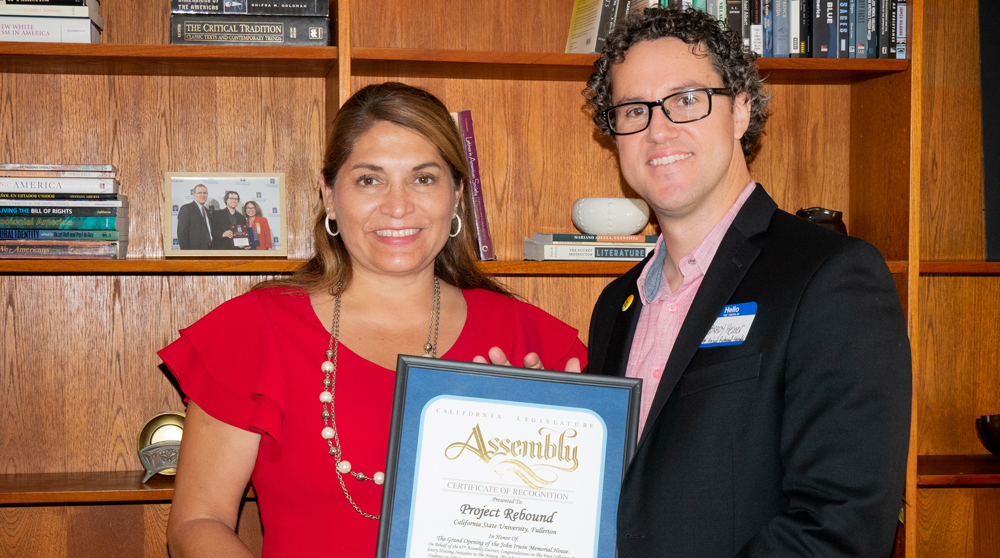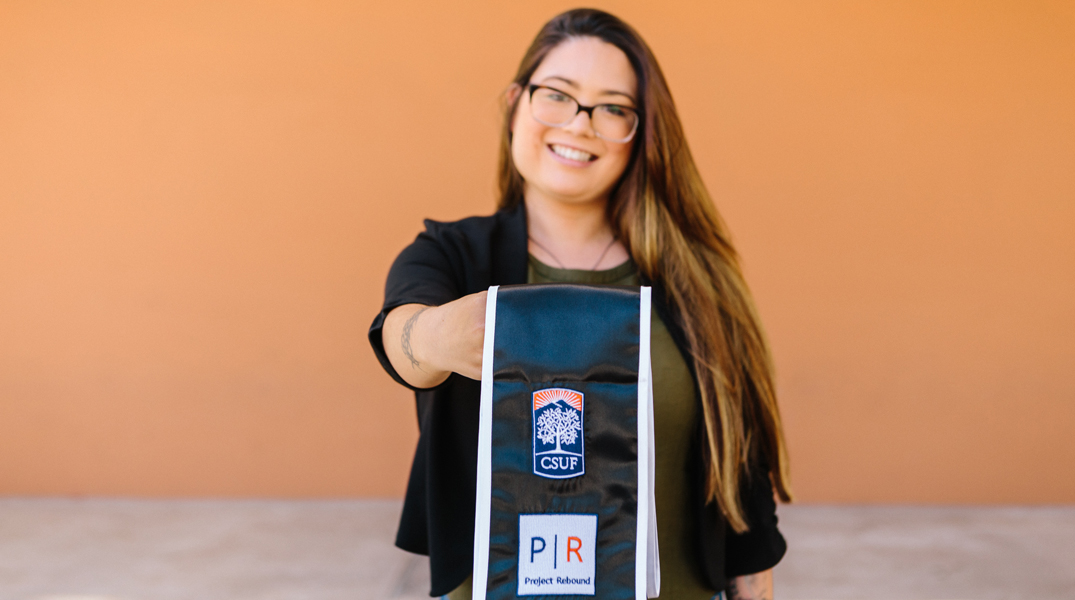Ginny Oshiro stepped out of her car and onto the
California State University, Fullerton campus on her first day of class in 2018. This was her dream, to earn a college degree. And yet, she just couldn't shake the negative thoughts racing through her mind:
I don't belong here. I'm terrified. People are going to know.
The Bay Area native was afraid others would find out about her past: her battle with addiction and the multiple arrests. Thankfully, she had
Project Rebound in her corner, a CSU program that supports the reintegration and education of the formerly incarcerated.
Oshiro found her way to Program Director Romarilyn Ralston's office and cried. “She told me, 'Not only do you belong here, but you need to sit in the front of the class and ask questions,'" Oshiro recalls. “'And if you don't have a question, raise your hand and add a comment.' She was the first person to tell me I belonged and I was allowed to take up space in a classroom."
Project Rebound has played a pivotal role in Oshiro's success, from those shaky first days to her recent graduation with a bachelor's degree in criminal justice. In the fall, she'll enter University of California, Irvine's Criminology, Law, and Society Ph.D. program. “The CSU prepared me to go directly into a Ph.D. program as opposed to getting my master's and then going in," she says. “If Project Rebound hadn't looked holistically at my application, chances are I wouldn't have been at Cal State Fullerton. It changed my life completely."
Oshiro's is just one of a multitude of lives transformed by Project Rebound. For more than 50 years, the program has exemplified its mission of providing equitable access to a quality education.
THE BIRTH OF PROJECT REBOUND
While serving five years in prison for armed robbery, John Irwin enrolled in a few college classes and was inspired to learn more. Upon his release, he earned a bachelor's degree from the University of California, Los Angeles and a Ph.D. from UC Berkeley. In 1967, he created Project Rebound at
San Francisco State University, where he was a professor of sociology and criminology for 27 years.
“Irwin built Project Rebound as a mechanism for onboarding and supporting people from the prison system into the California State University system," says Brady Heiner, Ph.D., chair of the CSU Project Rebound Consortium, founder and executive director of Project Rebound at CSUF and associate professor of philosophy.
“Ninety-eight percent of people who are incarcerated are going to be released. In what state do we want them to come home? It's in everyone's interest that they have an ability to live meaningful, prosperous and purposeful lives. Investing in opportunities for formerly incarcerated people is a public safety intervention."
— Brady Heiner, Ph.D., chair of the CSU Project Rebound Consortium and executive director of Project Rebound at Cal State Fullerton
In 2016, the program expanded to seven more CSU campuses and is now offered at a total of nine:
California State University, Bakersfield;
California State University, Fresno; CSUF;
California State University, Los Angeles;
California State Polytechnic University, Pomona;
California State University, Sacramento;
California State University, San Bernardino;
San Diego State University and SFSU. In the fall, the Project Rebound Consortium will launch programs at five additional campuses: Humboldt, Long Beach, Northridge, San Marcos and Stanislaus.
“The CSU works to build pathways for historically marginalized people to more purposeful and prosperous lives," Dr. Heiner says. “Project Rebound, which is designed to give people a second chance, is very much in alignment with the CSU's mission."

Assemblywoman Sharon Quirk-Silva presents Brady Heiner, Ph.D., chair of the CSU Project Rebound Consortium, with a Certificate of Recognition for his work with the program.
REMOVING BARRIERS
Transitioning from prison back into society is daunting in its own right. Navigating all that comes along with college can be even more challenging. That's why Project Rebound assists students every step of the way—even while they are still incarcerated.
“Thousands of letters go back and forth from the CSU to folks inside the prison system," Heiner explains. “We do individualized pre-matriculation advising and academic assessments and help with applications, transcripts and fees not covered by financial aid. Once students are enrolled, we fold them into a caring community of people who are themselves formerly incarcerated. We have students who have learned to reach back and provide mentorship and training to those coming out."
The program offers assistance with legal services, counseling, tutoring, computer literacy, mentorship, employment, housing, transportation and food security. Often what students struggle with, Heiner says, is not academics—it's all the barriers between home and getting to class. What Project Rebound strives to do is remove those obstacles.
“We don't just say, 'Hey, here's this resource, here's this office on campus, here's this agency in the community that could be of assistance to you,'" he says. “We walk them there and connect them with a person we have a relationship with.
“Most of our students didn't receive a real first chance," Heiner continues. “They are foster youth or survivors of violence and come from communities in which chronic under-education, unemployment and substance abuse were prevalent. One of the things we're intentional about doing is providing opportunities for our students and staff to mentor youth."
When Project Rebound first started at Cal State Fullerton, it had four students. The campus now serves 75.
“The state of California spends more than $72,000 a year to keep someone in a cage. For a fraction of that, Project Rebound can provide folks with a community and meaningful access to opportunity. The cost benefit analysis is clear."
— Brady Heiner, Ph.D., chair of the CSU Project Rebound Consortium and executive director of Project Rebound at Cal State Fullerton
ROAD TO REDEMPTION
In the end, Oshiro took Ralston's advice and sat in the front of each class, raising her hand and engaging whenever possible. Project Rebound helped pay for textbooks, parking and meals. That support boosted her self-esteem and allowed her to focus on schoolwork. She also found the community she so needed. “Immediately, I had this space on campus that provided a safe place to go with people who'd been where I'd been and understood why this journey could be terrifying and exciting," she recalls. “It was a constant reminder I wasn't alone in this."
The support worked. Oshiro made the CSUF Dean's List every semester. And with help from her mentors Assistant Professor of Criminal Justice Veronica Herrera, Ph.D., and Ralston, she quickly developed into a leader on campus who focused on giving back to the community.

"Part of me is relieved there wasn't a graduation ceremony [due to COVID-19] because I know I would have been bawling in the hot sun," Ginny Oshiro jokes.
“Romarilyn supported me in creating
Rebound Scholars, which is our student organization," she says. “There have been countless opportunities where Project Rebound has invited me to speak in classrooms, in communities and at events. I was also connected with the
Women's Policy Institute, where I have a statewide fellowship."
Oshiro was the recipient of the Titans Leaving Their Legacy award, Student Organization President of the Year, the John Irwin Memorial Merit Scholarship, the William G. Pollack Scholarship, the 2018 Project Rebound Award for Community Service and Engagement and the 2019 Project Rebound Award for Outstanding Leadership.
“I wouldn't have these opportunities if I hadn't got the second, third, fourth chance Project Rebound gave me," Oshiro says. “They taught me I don't have to hide from my past. I don't have to dwell on it, either. I've been empowered to integrate who I've been with who I am today with who I'd like to be. It's entirely reshaped my realm of possibilities."
Oshiro now considers the CSU family. And once she completes her doctorate with a focus on corrections, it's one to which she hopes to return.
“I'm excited about the possibility of coming back to the CSU system to teach," she says. “My criminal justice teachers at Cal State Fullerton have impacted my trajectory. The CSU system is a great place to touch hearts and minds while also educating people and potentially being that mentor for someone else. I'm going to do whatever it takes to not just pay it back but pay it forward."
Find out more about the opportunities Project Rebound provides incarcerated and formerly incarcerated students.